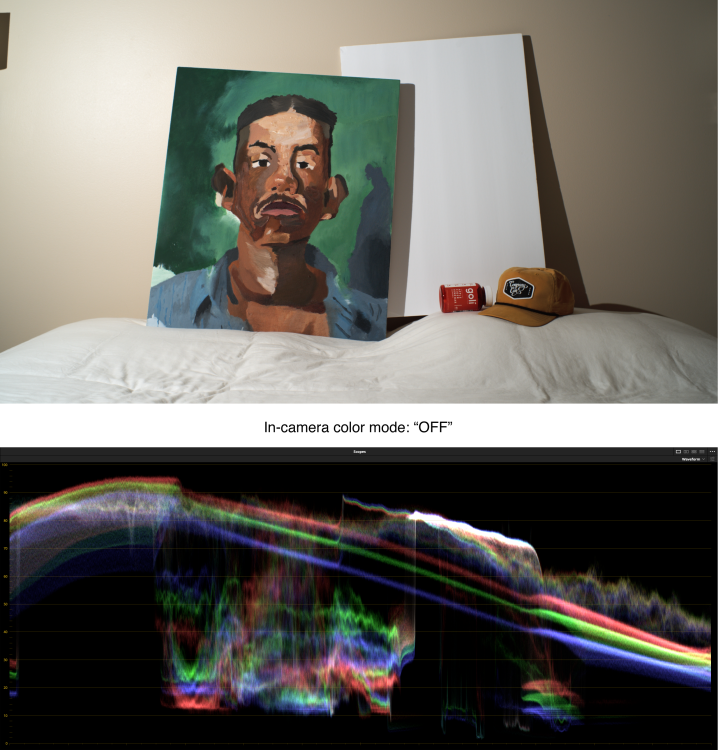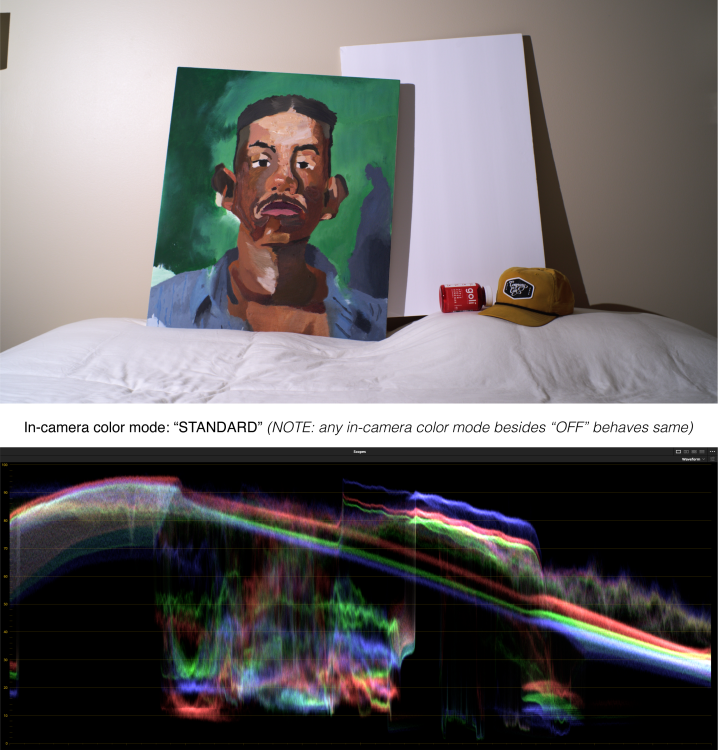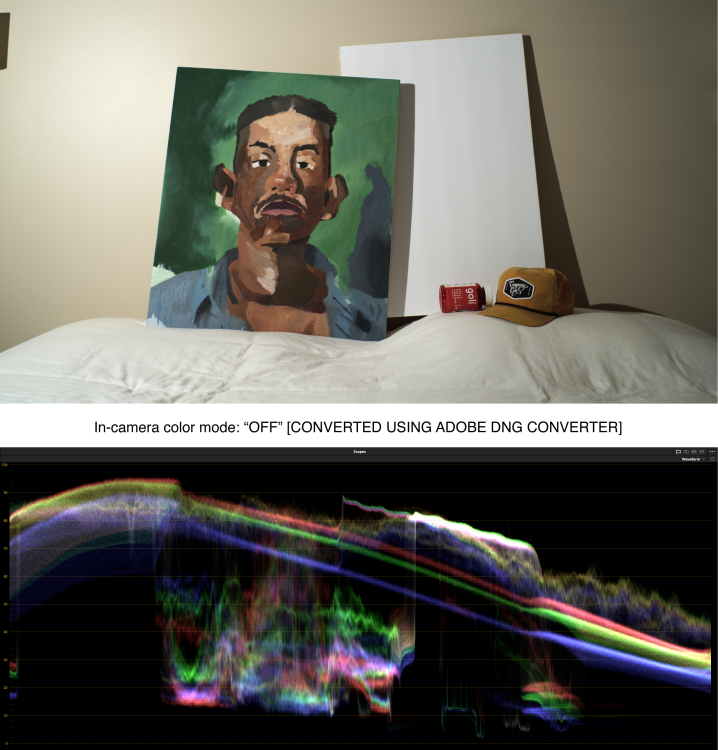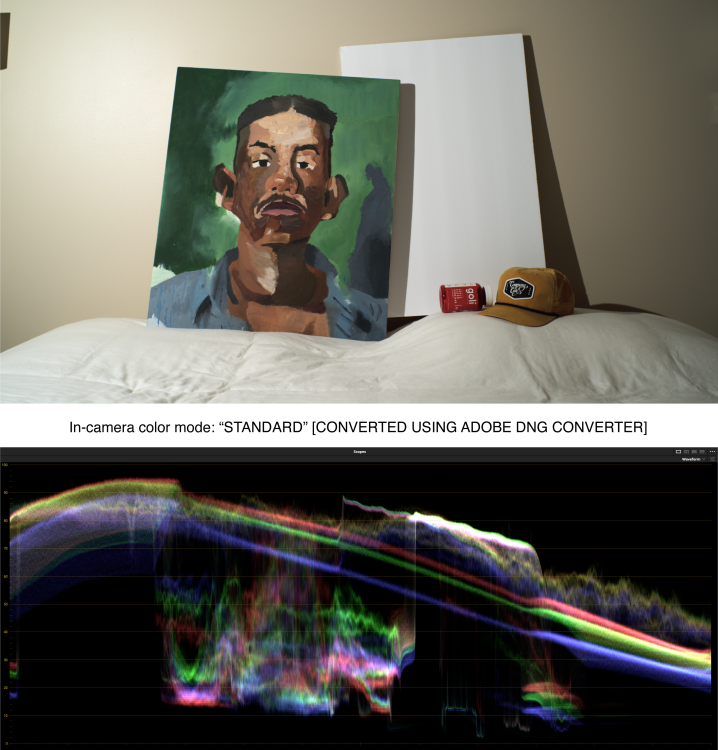
Devon
Members-
Posts
56 -
Joined
-
Last visited
Devon's Achievements

Member (2/5)
9
Reputation
-
Thanks to you both! Yes, I assume its reasonable to believe many manufacturers to these kinds of things to "help" the selling of their products. Mostly, I dont want a cheap battery that claims to have over circuit protection, and really not.
-
 IronFilm reacted to a post in a topic:
Help me pick an NP-F battery
IronFilm reacted to a post in a topic:
Help me pick an NP-F battery
-
Hello filmmakers. I hate to do it again, but I’d love fresh new perspective for the new year. I’ve purchased a Sigma FP as another cam, and am rigging it out. I’m attracted to its small form factor. So mounting a V-Mount defeats the purpose of keeping it small. So I’ve decided to go with NP-F batteries to power the rig. I’ve had to have the camera repaired by sigma once already as somehow I fried the PCB board by failing to shut off my camera before disassembly. I’ve since upgraded to SmallRig’s latest NP-F plate, which has built-in overcurrent and short circuit protection (to prevent me from frying the board again since I tend to move fast sometimes.) Because of this, I’ve created a whole new fear of frying another board, with any camera in my future. I feel better having the new SmallRig plate, but also have noticed some NP-F batteries advertise that they have a built in chip to also protect from over-current/short circuiting. I can’t get myself to purchase a true Sony NP-F as they’re so expensive and seemingly hard to find. So, I’m gonna give some Amazon brands a chance. I also have a gift card to Amazon from the holidays, so I’d prefer to use it. I’ve used Wasabi Power batteries for other cameras and have generally been happy. Check out this link though, as this person disassembled a lot of 3rd party NP-F batteries and found that they’re not even wired to deliver their claimed capacity. He also disassembled a Wasabi Power NP-F and found there was steel taped to the batteries. Seems sketchy, unless there’s a real use that I’m unaware of? Bummer. The only high capacity 990 I can find on Amazon is from Kastar. The reviews also are not great, claiming that the capacity isn’t as high as claimed. It also says it has a built-in circuit protection chip. Anyone like Kastar batteries despite being seemingly some of the cheapest on Amazon? The Wasabi Power NP-F (linked above) has great reviews, has built in chip, but it looks like the forum poster (linked above/first link) left their findings as a review too. Bummer, as I like this brand. They have a good warranty too. Still considering it anyway. I know Watson batteries are generally good. But the price is still high. Still onsidering it though. Any other decent 3rd party Amazon brands ya’ll have had a good experience with? Again, I don’t wanna fry my board. So a battery with a circuit protection chip is preferred. Thanks all!
-
 Llaasseerr reacted to a post in a topic:
Sigma Fp review and interview / Cinema DNG RAW
Llaasseerr reacted to a post in a topic:
Sigma Fp review and interview / Cinema DNG RAW
-
I’m not sure what caused the issue. Except that I pulled the dummy battery out and back in with the camera still switched on a few times throughout the past few weeks I’ve had it. I’ve always done this with all of my cameras when breaking down my rig after a shoot. I’ve always just left the switch set to “on” with the camera. This is the only cause I can think of. Sigma UK told me that the camera expects voltages between 7V and 9V. So I wouldn’t worry about your dummy battery. I’d worry more about the plate you’re using and it’s voltage and amperage it’s outputting. I’ve also just ordered the powrig dummy battery. I asked powrig if the dummy battery had any advanced circuitry for regulating power. They assured me that it did. I’m not exactly sure if this is true or not 🤷♂️ But they assured me 😅 I’ve also purchased the newest NP-F battery plate from SmallRig. It has short circuit protection built into all outputs. It was expensive, but my hopes are that I’ll have it for many years using with various camera rigs. So my hope is that the combination of both of these accessories (powrig dummy battery and advanced SmallRig plate) avoids this issue of any PCB board frying again lol.
-
syands1619 started following Devon
-
 Llaasseerr reacted to a post in a topic:
Sigma Fp review and interview / Cinema DNG RAW
Llaasseerr reacted to a post in a topic:
Sigma Fp review and interview / Cinema DNG RAW
-
On an unfortunate note, I had to send my FP in for repair. Randomly one a week ago, the camera would not turn on. And that was after just sitting off all night. The night before it worked just fine. Sigma New York told me this: "The 3rd party battery used was an improper voltage and fried the Main PCB Board. The voltage of your battery was 7.4. The standard for the camera is 7.2" I've had this camera for about 5-6 weeks. I've shot more than a few terabytes in the time that I've had it. During shoots (frankly, 99% of the time I've had it) I ran the Smallrig NP-F battery plate with NP-F batteries through a dummy battery into the camera. See links below. It is my understanding that voltage fluctuates. The camera is listed as "7.2v 2A". The Smallrig battery plate outputs "7.4v 2A" (according to a comment on their site.) The dummy battery lists its specs as "7V-9V 2A". A few questions: It seems hard to believe the only 0.2 Voltage increase fried the board? Is it possible with such a slight increase? It's odd because im pretty sure voltage fluctuates with battery usage. I assume the dummy battery doesn't convert 7.4v to 9v right? Wouldn't it just pass through the voltage it's given? One more interesting note: The last night it still worked, I ejected my Samsung T5 drive from the camera after shooting a few clips, plugged it into my Mac, organized my files, then it wouldn't eject. It wouldn't let me force eject it either. So I decided to just pull it. Then I plugged it back into my camera where it belongs. Then it just sat powered off all night. Next day, nothing. I plugged in that same hard drive a few minutes ago, and it will not mount to my computer. So maybe a file system error? Could it be possible that the hard drive caused an error in the camera's firmware? I'm at a loss, because it seems all my power options are to specification (or very very close). I read in another forum from someone else who contacted Sigma, and they said that the FP could run between 5v-9v. Please help. 😅 Links to products: Smallrig battery plate Dummy battery
-
I couldn't agree more. There are certainly a few things that Sigma need to define for a proper DI workflow. I understand releasing a camera early and providing firmware updates later as a plan to sell a camera. We might be a few years out from a proper DI workflow documentation from Sigma. That being said, the camera most definitely is a beast. I've been very impressed so far! @Llaasseerr I simply followed their email address listed on their site: info@sigmaphoto.com It took them a few days to reply, but I appreciate that they did.
-
 OleB reacted to a post in a topic:
Sigma Fp review and interview / Cinema DNG RAW
OleB reacted to a post in a topic:
Sigma Fp review and interview / Cinema DNG RAW
-
I reached out to Sigma as well as this forum post. This is the reply I've received from them. “In regard to the customer's reply, we currently recognize the difference in color parameters for DNG files recorded with Color Modes or with the Color Mode "OFF '' setting to be a specification of the camera and not a bug. To go a little further, the color mode parameters for any Color Mode that is not "OFF" will have the same color parameters when processed in DaVinci. This was done to render colors more natural to the human eye. The Color Mode "OFF" parameters were chosen to preserve the camera's original gamut. That is why the color processing and white balancing is slightly different between the two. If the user prefers to shoot with any of the Color Modes other than "OFF" selected for ease of filming, then we would recommend them to shoot all video with any of the Color Modes other than "OFF" for continuity in grading. Please inform the customer that their feedback is valuable to use and we will share it with our engineers for consideration in future product development. Also, we would like to thank them for their feedback about the wording in the fp user`s manual. We apologize if the wording was misleading in any way and will consider if any revisions are necessary for more clarity.” I've always had great interactions with Sigma. This is just more proof of that. As colorists though, don't we all prefer the "original gamut" over any creative interpretation?
-
 kye reacted to a post in a topic:
Sigma Fp review and interview / Cinema DNG RAW
kye reacted to a post in a topic:
Sigma Fp review and interview / Cinema DNG RAW
-
I have. So far no replies unfortunately 😔 Here: https://forum.blackmagicdesign.com/viewtopic.php?f=21&t=188556&p=983237#p983237
-
Most definitely. Hope this gets resolved.
-
peggieal91 started following Devon
-
Unfortunately not. The camera original DNGs using a color mode, are impossible to match to the “OFF” clips via white balance in the RAW panel
-
Exactly my thoughts. Simple white balance on the color activated clips prove much more difficult versus just shooting with color mode "OFF" makes balancing far faster. It's just a bummer, because having a color mode activated makes it so much easier to pull focus and judge exposure when filming 😭
-
 kye reacted to a post in a topic:
Sigma Fp review and interview / Cinema DNG RAW
kye reacted to a post in a topic:
Sigma Fp review and interview / Cinema DNG RAW
-
 mercer reacted to a post in a topic:
Sigma Fp review and interview / Cinema DNG RAW
mercer reacted to a post in a topic:
Sigma Fp review and interview / Cinema DNG RAW
-
Hey all! I’ve been following this thread since it started in 2019. I’ve finally got me my own Sigma FP! So far, I am loving the camera. I think I was lucky to wait so long to get me an FP, as now we are on firmware Ver.5.02 and the camera seems to run pretty smoothly! I’m very happy, and haven’t noticed any of the bugs mentioned back in 2019/initial release. Apologies to resurrect this thread after a year. But I found something for those of you still shooting with the FP. I have noticed a new “bug”. One that I think is easy to overlook for the fast paced video producer. (Again, apologies if this has already been found.) We did a video shoot, and I noticed that the footage was a bit harder to white balance than our other (Blackmagic) cameras. So I did a test. The results of the test are a little concerning (at least for the sake of color consistency.) See images in this post. I will also post a link to my Davinci Project file, and single DNG frames from my tests. I set up a few objects in my apartment to capture different colors (apologies for not having a true color checker chart.) A green painting, white foam core board, a red roll of tape, and a yellow hat. I literally had nothing blue to film, but the painting has a little blue in it. I wasn’t testing for color ACCURACY, as much as I was testing for color CONSISTENCY. Everything is lit by a single Godox SL60. No house lights were on, and I blacked out all windows to make sure everything was lit by a single source for consistent color and exposure. The Sigma FP was mounted on a tripod, all camera settings & lens stayed exactly the same for each clip, EXCEPT I changed the in-camera color mode. All clips shot UHD DNG 12bit. This is where our “bug” is: in-camera color modes. I have noticed that shooting clips (CinemaDNG/RAW, every resolution and frame rate) with ANY color mode activated EXCEPT color mode “OFF”, exhibits shifts in Davinci Resolve. It has always been my experience that in-camera color modes DO NOT affect how RAW data debayers in post. It’s always been, “RAW is RAW.” “Sensor data is sensor data.” SO, I shot a clip for each color mode. What I found is that color-mode: “OFF” produced footage as expected. It balanced and graded easily. BUT any clip shot with ANY other color-mode activated, exhibited color imbalance/shifts. The images in this post are a representation of this issue. In DaVinci Resolve, I balanced the in-camera color mode “OFF” clip, to make the white foam core in the frame neutral. White balance adjustments were done in the RAW panel on the color page. I then applied that same grade to all other clips. I debayered every clip as P3-D60, linear. White balance stayed the SAME between each clip. In my node graphs, I then color space transformed from P3-D60, linear, to REC709, REC709. Tone mapping set to “None”. I did simple Lift gamma gain adjustments for contrast, added saturation, then soft clip to keep things from clipping (all on separate nodes.) Again, the very exact same RAW panel settings, and nodes were applied to each clip. Still curious, I opened the DNG’s in Adobe Camera RAW. Adobe Camera RAW DID NOT exhibit the same balancing issues as Davinci Resolve did. Both DNG’s debayered identically in Adobe Camera RAW/Lightroom. This possibly means that the RAW sensor data between “OFF” clips and activated color mode clips, has consistency. I suspect there’s something in the DNG metadata throwing things off in Davinci Resolve. SO, I had the idea to convert camera original DNG’s using Adobe DNG Converter. Lo and behold, after conversion using Adobe DNG Converter, both clips were visually identical when imported and debayered in Davinci Resolve. In fact, the Adobe DNG Converted DNG's very closely resembled the color mode "OFF" original. I had this idea because I know some people use DNG Converter to get lossless (or lossy) compression to their DNG sequences. The issue with that/this workflow, is that Adobe DNG Converter removes some Cinema DNG metadata like frame rate, timecode, and I noticed that it reports “16 bit” color depth (among other things. [Just use SLIMRAW software for compression to avoid these metadata issues.] Adobe DNG Converter is ultimately meant for use by photographers.) Since Adobe DNG Converter strips metadata, it must be stripping the metadata that is causing Davinci Resolve to debayer clips differently. EXIFTOOL shows a few differences between the DNG’s. I suspect the culprit is the “color matrix” difference between these clips. Although I’m not a software engineer, so which metadata it truly is requires someone smarter than me. Maybe some of the Magic Lantern developers could have some insight for us? I will leave out the EXIFTOOL reports since this post is already very lengthy. I’ve tested a lot of cameras, and have never experienced this issue with any other RAW footage I’ve shot and graded. Dear Sigma, if you find this post; thank you for making full frame RAW available to those of us without a big budget. You changed the game because of that. Props to you all! I hope you find this post, and patch this metadata issue (probably?) for CinemaDNG clips. DNG's and Davinci Resolve project files here: https://www.mediafire.com/file/lf9jmvqz5eyajfz/Sigma-FP-Ver.5.02-DNG-Debayer.zip/file
-
Has anyone noticed that RAW debayers slightly differently in DaVinci Resolve when using different "Color" modes in-camera? I was shooting some tests, in a controlled lighting situation, one clip I shot 12bit UHD DNG using "T&O" color mode. Then another clip with color mode set to "Off". Same subject no change in settings. When editing the "Off" clip, the colors were more muted, and white balance needed adjusting. What could be happening here? I thought RAW was RAW. That any in-camera color settings shouldn't affect the RAW data.
-
Newb question here. After some reading, it sounds like I need to create a display LUT to monitor more accurately with my GUI monitor. To get as accurate as I can with a GUI display: I have a SPYDER colorimeter, and will use displayCAL to create the LUT. Once it's created, I should disable "Use Mac Display Color Profiles for Viewers" and use the LUT for output monitoring? Right? Or should I have "Use Mac Display Color Profiles for Viewers" ENABLED in combination with the display LUT?
-
I just got me an old set of Yashica auxiliary lenses from the antique store. See the image below for the included manual. Doesn't an auxiliary lens keep the same aperture in relation to it's COMBINED (taking lens + auxiliary) focal length? For the wide auxiliary lens, why does it specify "f4" for the maximum aperture? (I think the multiplication factor of the wide auxiliary lens is really .84x aside from the manual stating "0.8x".) These lenses were usually sold for the Yashica Electro 35, which came with a fixed lens: 45mm F1.7. For example: Electro 35 Lens with no adapter: Focal length: 45mm Entrance pupil diameter (aperture): 26.47mm (f1.7) Add the wide auxiliary lens: Focal length: 45 x 0.84 = 37.8mm Entrance pupil diameter (aperture): 26.47 x 0.84 = 22.23mm Divide focal length by entrance pupil: 37.8 / 22.23 = 1.7 (f.17) Electro 35 Lens WITH wide auxiliary adapter = 37.8mm f1.7 Can somebody help me understand where "f4" comes from? Is my math/thinking wrong?
-
 Devon reacted to a post in a topic:
Magic Lantern Raw Video
Devon reacted to a post in a topic:
Magic Lantern Raw Video
-
I did! Looks like it is. But how is it achieving that? Is it line skipping, pixel binning, or super sampling?





